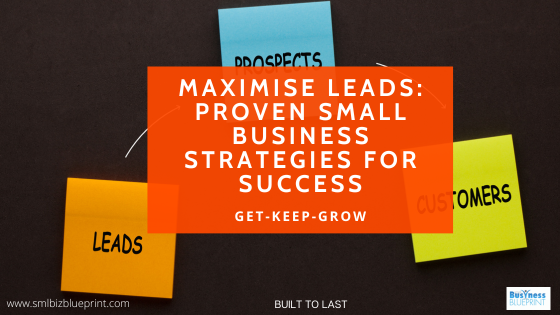In the bustling world of small and medium-sized enterprises (SMEs), mastering the art of lead generation isn’t just an advantage; it’s a necessity.
The ability to attract and engage potential customers is the cornerstone of growth and sustainability in a market where competition is fierce.
This article explores proven strategies that can transform your lead generation efforts, ensuring your business survives and thrives.

Identifying Your Target Audience:
Effective lead generation begins with a clear understanding of your ideal customers. By delineating your target audience, you can tailor your marketing strategies to their needs and preferences.
For instance, a boutique fitness studio might focus on young professionals seeking personalised wellness plans, using targeted messaging to appeal directly to this demographic.
Actions
Conduct Market Research:
Use surveys, interviews, and data analysis to understand your ideal customer’s demographics, interests, and behaviours.
Analyse Competitors:
Look at who your competitors are targeting and how. Identify gaps in their strategies that you can exploit.
Create Buyer Personas:
Based on your research, create detailed profiles of your ideal customers to guide your marketing and sales strategies.
Social Media and Email Marketing
In today’s digital age, social media and email marketing are invaluable tools for reaching a wide audience. Platforms like Facebook, Instagram, and LinkedIn allow SMEs to showcase their products or services, engage with customers, and build brand awareness.
Similarly, email marketing can nurture leads through personalised content when used effectively.
A local bakery, for example, could use email newsletters to share special offers and new product announcements, enticing subscribers to purchase.
Actions
Choose the Right Platforms:
Select the most popular social media platforms and email marketing tools with your target audience.
Develop a Content Calendar:
Plan and schedule regular, engaging content tailored to each platform’s specific audience and format.
Engage with Your Audience:
Regularly interact with your audience by responding to comments, messages, and emails to build relationships.
Establishing Authority and Building Trust
When done right, content marketing establishes your Small Business as an authority in its field. This could be through informative blog posts, how-to guides, or insightful videos.
For instance, a small tech company could release a series of articles on the latest industry trends, positioning itself as a knowledgeable leader in the tech community.
Actions
Identify Key Topics:
Determine relevant and valuable topics for your audience based on their interests and pain points.
Create and Share Content:
Develop various content types (blogs, videos, infographics) and share them on your website and social media.
Measure and Adapt:
Use analytics tools to track the performance of your content and adjust your strategy based on what resonates most with your audience.
Improving Visibility in Search Engine Results
Search Engine Optimization (SEO) is crucial for increasing online visibility. By optimising your website with relevant keywords, quality content, and a user-friendly design, you can rank higher in search engine results, making it easier for potential customers to find you.
A real estate agency, for example, could optimise its website with local property market keywords to attract potential home buyers in its region.
Actions
Keyword Research:
Identify relevant keywords that your target audience uses when searching for your products or services.
Optimise Website Content:
Incorporate keywords into your website’s content, meta tags, and URLs in a natural, reader-friendly manner.
Improve Website Performance:
Ensure your website is mobile-friendly, has fast loading times, and offers an excellent user experience.

Collaborating for Mutual Benefit
Networking and forming strategic partnerships can open doors to new lead-generation opportunities. Collaborating with complementary businesses or local community groups can expand your reach.
Imagine a small accounting firm partnering with a legal firm to offer combined services to local businesses – a strategy that benefits both parties.
Actions
Identify Potential Partners:
Look for businesses or organizations that complement yours and share a similar target audience.
Reach Out for Collaboration:
Contact potential partners with a proposal that outlines mutual benefits.
Joint Marketing Efforts:
Collaborate on marketing efforts like joint events, cross-promotions, or co-branded content.
Utilising Analytics and Feedback
Data analytics and customer feedback are vital for refining your lead generation strategy. They provide insights into what’s working and what isn’t, allowing you to make informed adjustments.
For example, an online retailer can use customer purchase data to understand buying patterns and tailor its marketing efforts accordingly.
Actions
Set Up Analytics Tools:
Implement tools like Google Analytics to track your website and campaign performance.
Regularly Review Data:
Periodically review analytics to understand customer behaviour and campaign effectiveness.
Collect Customer Feedback:
Use surveys, feedback forms, or direct communication to gather insights from your customers.
Investing in Targeted Ads
Paid advertising, such as Google Ads or social media ads, can precisely reach specific audiences.
A business selling eco-friendly products might use targeted ads to reach environmentally conscious consumers, significantly enhancing its lead generation efforts.
Actions
Define Your Advertising Goals:
Determine what you want to achieve, like increasing brand awareness or driving sales.
Select Platforms and Formats:
Choose advertising platforms (Google Ads, Facebook Ads) and formats (text, image, video) that best suit your objectives.
Monitor and Adjust Campaigns:
Regularly review the performance of your ads and adjust targeting, budget, and content as necessary.

Following Up and Nurturing Leads
The process doesn’t end with generating leads; following up and nurturing these leads is essential for conversion. Regular communication, personalised offers, and excellent customer service can turn a lead into a loyal customer.
Consider a software company that offers personalised demos to its leads, effectively demonstrating the value of its products.
Actions
Develop a Follow-Up Strategy:
Create a systematic approach for following up with leads at various sales funnel stages
Personalize Communication:
Tailor your follow-up messages based on the lead’s previous interactions with your business.
Use Automation Tools:
Implement CRM and marketing automation tools to streamline the follow-up process.
Must Haves
Clear Identification of Target Audience:
Understanding and clearly defining your target audience is fundamental. It allows Small Businesses to tailor their marketing efforts more effectively, ensuring they reach the right people with the right message. This step is crucial for the efficiency and success of all subsequent strategies.
Effective Use of Digital Marketing Tools:
Leveraging digital platforms, particularly social media and email marketing, is essential. These tools offer cost-effective ways to reach a broad audience, engage with potential customers, and build brand awareness. In the digital age, a strong online presence can significantly boost lead generation.
Regular Analysis and Adaptation:
Utilising analytics and feedback to refine your lead generation strategy continuously is a must. This involves regularly analysing campaign performance, understanding customer behaviours, and adapting strategies based on real data and customer feedback. This process helps make informed decisions and improves the effectiveness of lead-generation efforts over time.
Additional Options
Leverage Customer Reviews and Testimonials:
Encouraging satisfied customers to leave reviews or provide testimonials can be powerful. Displaying these reviews on your website and social media can boost credibility and attract new leads. For example, a small online retailer could include a customer review section on its product pages or share testimonials on its social media profiles.
Host or Participate in Online Webinars and Workshops:
This strategy is often overlooked but can be highly effective. Hosting or participating in webinars and workshops related to your industry can demonstrate expertise, provide value, and directly engage with a captive audience. This approach generates leads and positions your Small Business as a thought leader in your field. For instance, a digital marketing firm could host monthly webinars on the latest trends in digital advertising.
Utilise Gamification in Marketing:
Incorporating game design elements in non-game contexts, such as competitions, loyalty programs, or interactive quizzes, can significantly increase engagement and lead generation. This approach can create a fun and memorable experience for potential customers, making your brand stand out. For example, a café could introduce a loyalty program where customers earn points for every purchase, which can be redeemed for rewards.
In conclusion, effective lead generation for SMEs requires a multifaceted approach. Each aspect is critical, from understanding your audience to leveraging digital tools and nurturing leads.
Remember, lead generation is an ongoing journey that demands constant attention and adaptation.
FAQs
Q1: What are the first steps in identifying my target audience?
A1: Analyze your current customer base, market trends, and competitor strategies to define your potential customers’ specific demographics and interests.
Q2: How can I make my content marketing more effective?
A2: Focus on creating high-quality, relevant content that addresses the needs and questions of your target audience. Consistency and authenticity are key.
Q3: What are some SEO best practices for SMEs?
A3: Use relevant keywords, ensure your website is mobile-friendly, and regularly update your content to improve search engine rankings.
Q4: How often should I follow up with leads?
A4: This depends on the nature of your business and the customer’s buying cycle. Generally, regular but not overly frequent communication is advised.
Q5: Can SMEs compete with larger companies in digital marketing?
A5: Absolutely. SMEs can effectively compete with larger companies with a targeted, well-executed digital marketing strategy.
Q6: What are some cost-effective digital marketing tools for SMEs?
A6: Social media platforms, email marketing tools, and content management systems like WordPress are great, cost-effective options.
Q7: How important is mobile optimisation for my website?
A7: Extremely important. With the increasing use of smartphones, a mobile-optimized website provides a better user experience, potentially leading to higher conversion rates.




